- Home
- Geraldine Brooks
The Secret Chord Page 2
The Secret Chord Read online
Page 2
I was engaged myself then, by a bullnecked spearman who required all my flagging strength. He was bigger than me, but clumsy, and I used his size against him, so that as I feinted one way, he lunged with his spear, overbalanced and fell right onto the dagger that I held close and short at my side. I felt the metal grating against the bone of his rib, and then I mustered enough force to thrust the tip sharply upward, the blade’s full length inside him, in the direction of his heart. I felt the warm wetness of his insides closing about my fist. It was intimate as a rape.
When I made an end of it and could look up, the king had advanced again, to a higher ledge, and stood atop another fleeing adversary. Legs astride the body, he raised his dagger arm. The air throbbed then, the skirl of wings. A carrion bird. Reflexively, my eye followed it. That is how I saw the spearman. The setting sun had been hidden in a purple flounce of cloud, but just then a throbbing yellow crescent of fire broke the edge, and in the beam of sudden light, I caught a glint from behind the cover of an outcrop—a spear, poised for the cast. The spear thrower was above and to the right of the king. His legs were well braced, his line perfect. The bronze shaft sailed out of his hand. It would have been a lethal throw, if Yoav’s younger brother Avishai had not risked his own life to deflect it.
Avishai leaped between the king and the spear, his head back, howling. He expected to die. Every man on that ridge turned to witness it. At the deadly second, some warrior instinct caused him to adjust his stance by a hairbreadth and raise his bow. The spear tip caught on the edge of it, splintering the wood, skittering harmlessly across the rocky ledge. It was the kind of thing we’d seen David do. Now a younger man had done it for him.
We all cheered, of course. Someone slew the spearman, and then the fighting resumed in the exhilarated frenzy that comes from catastrophe averted.
But the king did not wish to hear of this from me. Not today. So I buried the image of his near death and said: “Every man who has served with you knows how you have prevailed. Every one of us knows what you are.”
“‘Are’? Say, rather, ‘were.’ That is what Yoav means: ‘You were a mighty soldier, but now we must fight your battles for you.’ I tell you, when Avishai leaped before that spear, I knew how it would be seen. I had to laud Avishai before the men. It was his due. But the words were gall in my mouth. And even though he is my sister’s son and the brother of my general, I tell you this, Natan: I wanted to strike him dead. I wanted to grasp the end of that shattered shaft and plunge it through his side. I have lived most of my life in soldiers’ camps. I know what they saw. I know how they think. Their confidence sours as sudden as curdled milk.”
“Not so. You may think you know the mind of the common soldier, but with respect—you are not one, and have not been for some time. The men know this, even if you do not. Times have changed, and you, King, have changed them. You are not that petty chieftain who led scattered bands of outlaws to skirmishes in the hills. Why do we not cower in the wastes, hiding amid thorns and rocks as we used to do every time a sortie out of Mitzrayim marched across our land? Why do we not huddle trapped in the highlands while the Plishtim garrison the passes to the fertile plains? It is not so long since we had to grovel to them for enough iron even to make farm tools, much less weapons. Now we push them to the coast and pursue them to the very gates of their towns. Now the very best of their fighters come and offer their sword hilts in your service. You know they would not bend the knee to any other man. Not they, nor the Hittites, nor the Yebusites, nor any other of the strangers who serve you. Do not tell me you would put all this at risk—after all it cost to bring it about—for some warrior-pride. You, who have nothing to prove to anyone about valor or skill at arms. You have taught our enemies to fear us. You are the lamp of Israel. Would you chance to quench it?”
I had thought what I said would stoke his vanity. Instead, he glared at me. His eyes, that amber gaze that I was used to feel warm with affection, had turned cold. “Spare me, Natan. I have had an earful of this womanly keening, these empty pieties. From you, at least, I expect to hear the truth. The truth is, I have made this army. It’s I who drove them, I who gave them confidence. Too much, it seems. They think they can do without me, set me aside like some heathen’s war-god idol, set up in a temple to bring good luck.” He turned away, back to the window. He flung open one of the shutters. A few minutes, and Yoav’s voice rose, giving the order to move out.
“Will you not go down? It would put heart into the troops.”
“‘Go down’?” He mimicked my solicitous tone in a voice oily with contempt. “To remind my men that I stay behind? That for the first time in memory I do not lead them? Are you mad? Of course I will not go down.”
A great cheer rose as the runners set off. The foot soldiers first—spears, archers, slings. This was followed by a clatter of hoofbeats and the squeal of metal wheels as fifty merkavot—a full half of all we had then—pulled out behind them. Dust motes rose from the street and drifted into the room, sparkling. He turned from the window, crossed the room and laid his fingers lightly upon the neck of his harp. There was always one near to hand; every servant knew to see to that. A small one hung by the window in his bedchamber. He said that when a night wind stirred the strings, it was a welcome awakening. He would rise from his bed and pray to the Name, who had blessed him so greatly. The instrument he reached for now was one of his favorites, a fine tall harp from Mitzrayim, the slender curve of its soundboard a smooth and perfect arc such as that land’s craftsmen know how to fashion. But, like all his harps, this one had been adapted to his use, the number of its strings doubled to allow for strange tunings, with half and quarter tones that gave his music its unique, complex sound.
“You know, I suppose, why Yoav sent you.” I was unsure how to answer this. I did not want him to think that Yoav and I had been discussing ways to handle him, even though this was the truth. But it seemed he did not expect an answer. He snorted, and gave a smile that had no joy in it. “I know what Yoav has in his mind: he sees me sitting here with you, picking at the skein of my deeds like a woman at her weaving basket. He wants to give me occupation while he usurps my place and marches my men to war. You, I suppose, support him in this.”
“No, I do not.”
“No?” He looked up. “What’s this? You are at odds with Yoav?”
“I do not think a recitation of your victories is worthy of your time.” I took a breath and dived deep. “Nor mine.”
“Is that so? My victories are an unworthy subject for your talents?”
Have a care, Natan, I told myself. It is one thing to speak hard truths to a king in that strange voice that rises up unbidden from the earth and echoes with the power of the heavens. It is another thing entirely to speak frankly to him as one man to another, especially as I am a man in his service. Eved hamalek. The servant of the king. But, then, what service could I offer, if not this: speaking, where other men held a prudent peace. Whatever the risk, I had him now. His anger was shifting, away from Yoav and toward me. I had drawn the boar. Now I had to stick him.
“Any half-skilled graver can etch a stela that says in this or that place the king did vanquish this or that people. I am sure the great king of the Two Rivers and your neighbor the pharaoh, each of them, has a legion of gravers at work this very moment, making fine monuments.”
“And why should they not?”
“Because the rubble of a hundred such stelae lines the walls of our sheep folds. And the dust of a thousand more blows about the Land, ground down to sand.”
He gave me a glance that, if not warm, was no longer a shard of cold stone. He returned his gaze to the harp, running a finger up and down the silken grain of the wood. “Go on.”
“In our wine store at home, there was a graved stone, holding up the lintel. Basalt, I think, finely dressed. It stood out among the common limestone, so that was why I noticed it, I suppose, when I was a boy. There were just
a few words of an inscription, very worn. I was excited when I found it—it is the kind of thing that fires the mind of a child—and I showed my father.” I remembered the cool dark cavern carved deep into the rock, the tall, sweating rows of pithoi, the biscuit scent of the clay, the rich aroma of fermentation. My father’s large hand, stained from many pressings, fingering the hollows etched into the stone. I remember that he turned to me, and smiled, and commended me for noticing it. “He was an unlettered man, but he guessed the writing might be in the style of the Hittites. No doubt it lauded the victory of some important leader. I would look at those words and wonder, Who was he? What manner of man? What sort of boy? Which people helped him to power? Which hindered him . . .” I paused, uncertain whether to continue. But David’s gaze was on me now, arrested. So I plowed on.
“Whoever he was, he was gone. His story, however glorious, lost, and so thoroughly forgotten that his monument had been broken up into building stones and set to use in a humble vintner’s storeroom.” Here we came to the nub of it. My own voice had risen as I spoke. I took a breath, and lowered it. “You know my first prophecy.” Even as I said the words, I felt sickness rise at my own memory of it. When one becomes a sounding brass for the voice of the unseen, there is a price to be paid: the throbbing head, the darkening vision, the rasping breath, the falling fits and spasms. And when it happens to you on a day when you have lost everything, a wicked day of death and butchery, it is hard, indeed, to revisit the moment. I had begun to breathe unevenly, just bringing it to mind.
“Of course I know. I have built all this”—he swept his arm in a wide, expansive gesture meant to encompass more than a fine room in a well-built palace—“on the foundation of those words. Every man alive knows what you said that day.”
“It was not I who said it,” I murmured, but he shrugged off my correction.
“What has that to do with this matter?”
“Your line will not fail. You know this. Yet memory surely will. Your sons—what will they remember? Or their sons, after? When all who knew you in life are but bleached bone and dust, your descendants, your people, will crave to understand what manner of man you were when you did these deeds, first and last. Not just the deeds. The man.”
He gazed at me for a long moment. His face was unreadable. He picked up a low carved stool then, and when I moved to take it from him, he waved me off. He carried it to the harp and settled himself to play. As an afterthought, he motioned me to sit, so I sank gratefully upon the pillows and let out the breath I had not even realized I was holding. He tilted the tall harp, settling it against his shoulder gently, as a woman settles her infant. His fingers rolled a few idle triplets, but his gaze was fixed on the distant view of hills, the olive trees silver in the sunlight.
“It is true, what you say.” All the anger was gone from his voice. “When I was a youth, learning war, I often thought of it. We hear of men like Shalmanezer or Sargon, who won great battles. Of Ramses, who built the mighty temples on the backs of our ancestors, or of Hammurabi, who, they say, ruled with wise laws. But these are names only. It would be something, to know their nature. To know them as men.” He paused, his eyes still distant. “To be known as a man.” His fingertips pressed harder against the strings. His hands were strong, but the fingers were slender, moving swiftly through the tall strings, weaving sound from the filaments.
It was as if the harp were a loom, the notes he drew from it a bright thread forming a splendid pattern. He played this way often, even interrupting meetings with his generals. He said that the music—its order and precision—helped him find the patterns in things—the way through the confusion of events and opinions to direction, to order, and beyond, to inspiration.
He played for some time. I do not know if he was improvising or playing from memory. The melody was sweet, intricate and soothing. You could read his mind through his music, always. I felt the tension in my body easing. I had been braced against his anger and his grief, but the music revealed a mellowing of his mood. Finally, he brought it to an end, in a graceful run of notes, and set the harp back upright. He turned his eyes on me. They were not cold now, but the expression remained opaque. “Catch a true likeness, see a plain reflection in the water of the well, you will not like the flaws revealed in the face that stares back at you.”
I struggled to suppress a smile. I could not imagine that his own reflection had ever given him much grief. The golden shimmer of his youth had been tempered like worked metal in his adult years so that even now, in middle age, he gleamed. Years had brought only distinction to a beauty that had proved irresistible to men and women alike. But he was serious, deep in consideration of what I had said. I thought it best to add nothing further, to let the line of his thought lead him to his own conclusions. He commenced to play again, but after a time, his fingers paused and hovered above the strings. He turned his face to me.
“Perhaps I can prove myself brave in this, at least. I will consider it. Now go.”
As the young guards’ spears hit the floor and the door closed behind me, he started to play in earnest. His large, strong hands could draw forth a breadth of sound that one did not generally associate with the gentle harp. He could make it speak with a thousand voices, soft or stormy. He did so now. And then, that other instrument over which he had full mastery—his voice. It was an old song; I recognized it. He had sung it at his coronation.
. . . in the day of thy power,
in the beauties of holiness
from the womb of the morning:
thou hast the dew of thy youth. . . .
Good, I thought. Already he has turned his mind from the gnarled present to the shimmering past.
• • •
The next day, he sent word that I might make the history if I wished to do so. I assumed he would call for me when he was ready to begin. Awaiting his summons, I busied myself with the pumice, scraping calfskin. This work I would not trust to fragile clay. I have yet to train a servant who can bring a hide to my standard, and the scrolls to record the life of a king had to be free of all blemish.
But instead of the call to audience, what came from him instead that afternoon was a clay tablet with a list of three names upon it. Seraiah, his scribe, had graven it, apparently in some haste. I had to carry the tablet to the light to make sense of his hand. At first, I did not understand what David meant by it, but then I grasped his purpose. It was very like him. He was sending me to talk to those who had known him in childhood and as a youth, before I came into his service. At the end of the short list of names, Seraiah had added a note: The king says: after these, you know the story as well as any and may set down what you see fit. I smiled when I saw what he intended. It seemed he did not plan to give his own account at all. The work here would fall all to me, to gather and record these testimonies, to write my own account. I ran a finger over the names. Mikhal. That one name, alone, showed that he did not depend upon the emergence of a flattering portrait. Mikhal, for whom his very name was bile. Well, I thought. That will be a challenging encounter. She had been his first wife and, in name, a wife she remained, although to my knowledge she and David had not seen each other nor exchanged words in years. But as she remained part of his household, if the king bade her speak to me she would be obliged, at least, to receive me.
For a seer, I was remarkably obtuse. I know this now; I did not know it then. Yoav and I had conspired to find some occupation that, while worthwhile in itself, would serve to distract a restless and unhappy king. Instead, he had found a way to distract me, to get me out of his way. A man will silence the voice of his conscience when it suits him to commit sin. But if your “conscience” walks and breathes as a living man in your service, you might have to go to some additional lengths. I did not see this. I did not see that a proud and vital man who feared his manhood waning might take any reckless step to prove to himself it wasn’t so. In the service of my gift, I have had to forgo much th
at makes a man in full. I know now that this sacrifice has left me blind to certain things. I can see what others cannot see, but sometimes I miss what is apparent to the dimmest simpleton.
At the time, I was caught up in the project, and interested in the names upon the list. One was unknown to me, and yet it was the very first he had set down. Seraiah the scribe had underscored it heavily, and written a note: The king says, This one, before all others. The next name, Shammah, I knew well enough. Shammah was one of David’s older brothers. There had been seven of them, but Shammah was the last still living. He had been with us in the outlaw years, when Shaul the king turned on David and sought his death. There had been little love lost between David and his brothers. But Shaul’s hatred of David had spread like a stain upon his close kin. They had been obliged to go into hiding with him in those years, because the alternative was imprisonment or execution. Now Shammah kept a household on the outskirts of Beit Lehem and administered that settlement in the king’s name. According to the tablet, the unfamiliar name, Nizevet bat Adael, was a woman who was part of Shammah’s household.
It was too late that day to set out, so I sent word to the stable to bespeak a mule for the following morning, and to the kitchens for provision. I left at first light.
II
There was a time, not long since, when no man would have traveled alone on the road from Yebus, as Ir David was then named, to Beit Lehem. It is easy enough to forget how it was in the Land, now that the trade roads are in good repair, the borders mostly respected and the bandits under the foot of the king’s forces. Of course, he understood very well what was necessary when he came to power because he had spent so many years himself as a bandit and a marauder, living on fines exacted from unlucky travelers and swift attacks on ill-defended villages like my own.

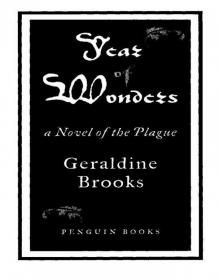 Year of Wonders
Year of Wonders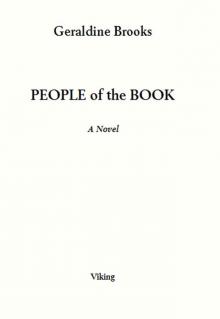 People of the Book
People of the Book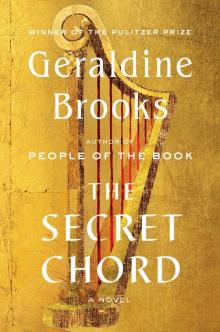 The Secret Chord
The Secret Chord Foreign Correspondence
Foreign Correspondence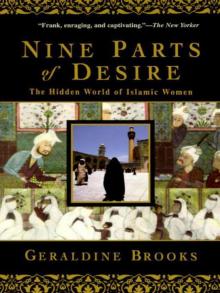 Nine Parts of Desire (Korean Edition)
Nine Parts of Desire (Korean Edition)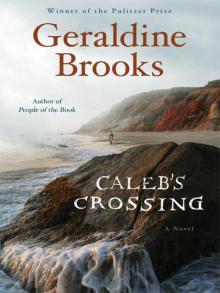 Caleb's Crossing
Caleb's Crossing The Idea of Home
The Idea of Home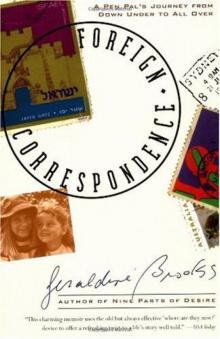 Foreign Correspondence: A Pen Pal's Journey
Foreign Correspondence: A Pen Pal's Journey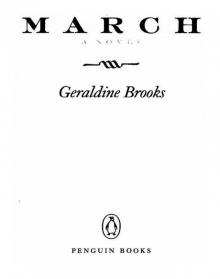 March
March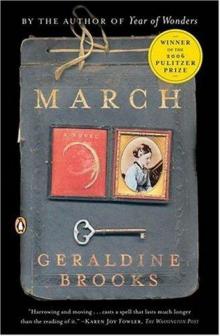 March: a novel
March: a novel The Best American Short Stories® 2011
The Best American Short Stories® 2011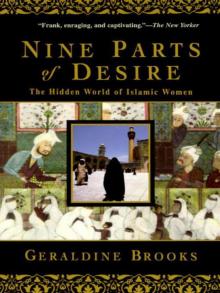 Nine Parts of Desire
Nine Parts of Desire